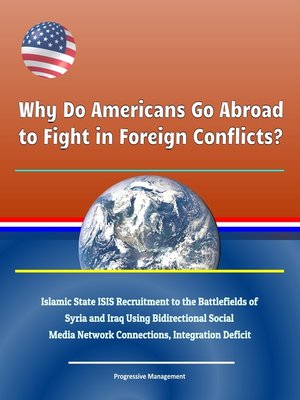Why Do Americans Go Abroad to Fight in Foreign Conflicts? Islamic State ISIS Recruitment to the Battlefields of Syria and Iraq Using Bidirectional Social Media Network...
ebook

Sign up to save your library
With an OverDrive account, you can save your favorite libraries for at-a-glance information about availability. Find out more about OverDrive accounts.
Find this title in Libby, the library reading app by OverDrive.



Search for a digital library with this title
Title found at these libraries:
| Library Name | Distance |
|---|---|
| Loading... |
This mid-2018 report has been professionally converted for accurate flowing-text e-book format reproduction. Why do Americans travel abroad to fight in civil conflicts? Since proclaiming the caliphate in 2014, the Islamic State (ISIS) has been recruiting men and women to the battlefields of Syria and Iraq from countries around the world. This study explores why American men and women volunteered to join ISIS and leave behind their families, their friends, and the comforts of American society. The profiles reviewed in the thesis were built from open-source documents. Three drivers were explored to explain this phenomenon: integration deficit, social media, and network connections. This study concluded that bidirectional social media use and social network connections were present in most of the cases surveyed.
The two most important reasons to study foreign fighters are the threat they pose to America's security and interests abroad—including the security and interests of America's allies—and the inherent danger of their return home as seasoned veterans of extremist causes. Since 9/11, United States citizens have left or attempted to leave participate in civil conflicts. The number we are concerned with is those who have left or attempted to leave the United States to aid the Islamic State. These militants are used as suicide bombers, propaganda agents, and general fighters for extremist organizations, such as Moner Mohammad Abu Salha, an American who was used as a suicide bomber in Syria in the name of al-Nusra front. Moner was motivated by lectures from Anwar al-Awlaki, the radical cleric. The radicalization of Abu Salha led to his suicide attack, in which he drove a truck filled with explosives into a restaurant filled with agents of the Syrian government. U.S. laws and interests prohibit support for anti-American extremists abroad. Providing Material Support to Terrorists, 18 U.S.C 2339A, is a law originally enacted in 1994 then expanded in 1996 to include providing property, money, lodging, training, and/or expert advice or assistance. Therefore, the U.S. strategy to stabilize Iraq and other conflict zones is threatened by support for ISIS from its own citizens.
Radicalization within the United States is not a new problem, but the potential for returning foreign fighters makes the threat even more menacing. "It is estimated that one out of every nine foreign fighters are likely to conduct a 'blowback' attack in their home country after returning from fighting abroad." For example, in the case of France and Belgium, the terrorists are homegrown lone actors who had traveled to Syria and back. Therefore, understanding the underlying motivations and causal drivers of American foreign fighters is a pressing security concern. This thesis contributes to existing efforts to counter this form of violent radicalization.
Chapter II of this thesis provides an overview of the history of foreign fighters. The overview is a brief history of foreign fights and American involvement in foreign conflicts in the modern period. The focus will narrow to the United States and compare trends that are related to the way foreign fighters have been targeted and recruited. Chapter III provides results from the data collection. This chapter also describes the analysis of each hypothesis and related findings, reveals gaps in the study and shortfalls of research and data collection. It also provides visualizations which detail the results of the analysis. Chapter IV is the conclusion and recommendation for those who want to expand the research.







